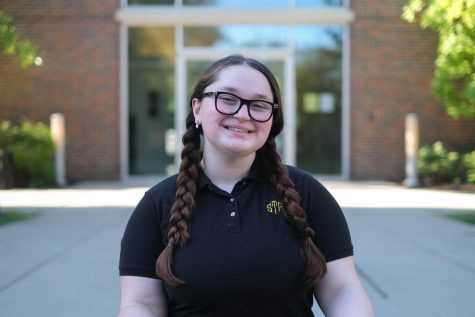Let’s Just BeReal
October 31, 2022
When junior Abby Margolin’s phone vibrates right as the bell signaling the end of class rings, she picks up her phone and her heartbeat quickens as she sees the notification: It’s time to BeReal.
“What I love about BeReal is that it’s just so fun and it connects me to others,” Margolin said.
BeReal is a social media app that allows users to take one photo using their front and back phone camera once a day at a completely random time. Users are allotted two minutes to take the photo and post it. BeReal has no filters, no likes. The app launched in 2020, but only recently gained large popularity over the summer, when it skyrocketed from 2.93 million active and daily users to 10 million.
BeReal’s popularity has made its mark at STA. In a poll sent last month, out of 122 responses, 77.9% said that they had BeReal downloaded on their phones.
Sophomore Rebecca McGannon likes BeReal because it gives her a chance to get a glimpse into other people’s lives, those that she may not see otherwise.
“BeReal lets me connect to people I don’t see everyday,” McGannon said. “My brother just moved to college and now I get to see a little part of his day.”
McGannon also likes BeReal because it helps her cut down on the time spent on social media. “I’m not spending a ton of time on BeReal like I am with TikTok or Snapchat,” McGannon said.
Sophomore Kendal Maxwell says she enjoys BeReal for its honesty and simplicity.
“BeReal helps me to see what people are doing at that exact moment, and I think that’s super cool,” Maxwell said.
Even though students had plenty of positive things to say about BeReal, the app also has its own share of downsides. Sophomore Annie Ward doesn’t like how the original message of the app has been misconstrued.
“I dislike how instead of being real, which is the whole point of the app, [the users] are being fake and pretending.” Ward said. “People will only post when they are with their friends or actually doing something instead of posting on time.”
Margolin also believes that there are downsides to BeReal, including making people feel excluded.
“I think that sometimes if a bunch of your friends are hanging out together, and you’re not there for whatever reason, and they post a BeReal together then you could feel left out,” Margolin said.
People also may have reason to dislike BeReal because of the inconveniences it causes.
“My BeReal pet peeve is all of the notifications I get from the app all of the time, but I can’t turn [the notifications] because then I might miss the BeReal.” McGannon said.
Maxwell doesn’t like having to show all of the people who can see her BeReal when she’s not doing anything exciting.
“I like that you don’t have to take [the BeReal] [the] moment it goes off, but I don’t like when [BeReal] goes off and I’m not doing anything good,” Maxwell said.
The administration at STA had its own concerns for BeReal. In September, principal of student affairs Liz Baker sent out a message attached to the daily “Today at STA” email that cautioned students against taking BeReals without the consent of anybody else pictured in the posts. When interviewed, Baker said neither she nor the administration held any prejudices against the application itself.
“Administratively, as with all applications that take pictures, I want people to abide by our photography policy,” Baker said. “I‘m not against BeReal and I like the idea of no filters; I think that’s healthy. But I also think that it may provide an opportunity for people to be less diligent in their asking for permission.”
Overall, the administration just wants students to stay safe and follow the rules outlined in the STA handbook.
“For BeReal, and any social media app that’s out there, like Snapchat, Instagram or Facebook, it can be detrimental to students if it’s used in a negative way, especially for teachers,” Baker said. “So that’s why we have our photography policy, so that you have to ask permission to take a picture and that way people aren’t assuming that you’re doing something that isn’t positive.”
Baker herself said she does not regularly use social media, so she doesn’t know a lot about how it might affect somebody personally.
“I’m not really sure [if BeReal is negatively affecting students] because I’m not a social media user. I feel that there are great positives to social media when people use it for the common good, and to have positive relationships with each other. But of course, any social media can have a negative aspect,” Baker said.
Baker would also like students to keep in mind that social media is not always an accurate representation of life.
“I don’t know if BeReal is trying to offset [the creation of online personas] but, really, what two minutes are you actually choosing to show people? Because what’s being real is being present and being attentive to people, that’s real,” Baker said. “And when you can manipulate what people see about you, it’s just not real. And lots of people think it is, and that’s the problem with social media is that people think that’s real, that’s all they see of you. They don’t see your hardships or your anxieties or your dirty bedroom or your dishes that are in the sink; they don’t see the reality of what’s really going on with you at the present moment.”



